- Home
- David Dalglish
Blood Of Gods (Book 3) Page 2
Blood Of Gods (Book 3) Read online
Page 2
“They will not last,” Ashhur said.
“Thulos will lead their charge,” said Karak. “Let us meet him and end this now. This world has no need for a God of War. Let Order and Justice be all that reigns.”
“We’ll reign over only corpses,” Ashhur said, thinking of the conquest Thulos had waged across the continent, devastating city after city.
Karak’s sword lifted higher.
“I can imagine worse fates,” he said. “Stand tall before our soldiers. We are their gods, their source of strength and courage. Do not fail them.”
Toward the crumbling gate they dashed, and their soldiers moved aside so their path remained unblocked. Rumble after rumble, crack after crack, multiple battering rams hammered into the steel-reinforced wood. Ashhur felt his focus narrowing, saw the sheen across his sword reach blinding levels. All his rage he focused into his weapon. With it, he could cleave stone and steel like warm butter. With it, he could even pierce the flesh of a god. A great bellowing cry left his throat, drowning out the cacophony unleashed by the shattering of the gates. Ashhur led the way, Karak a mere footstep behind, as Thulos’s paladins came surging forth. They held their radiant weapons, hammers and swords and axes, and their armor was the finest in the land, bronze-tinted steel that shimmered red with the power of their faith.
Against the rage of gods, that armor meant nothing.
Karak and Ashhur waded into them, and if the onslaught of paladins was a river, they were the dam. Blood soaked their armor, and every swing of their weapons brought down dozens. At either side were Allaketh’s defenders, forming an enclosing ring so that any who somehow survived were quickly cut down. Soon the door was sealed with the bodies of the dead. His weapon heavy in his hand, Ashhur took a step back to survey all they’d done. Hundreds of paladins, Thulos’s finest, broken by their fury.
But Thulos was not there.
“We have been played for fools,” Karak said, and Ashhur heard the trace of fear buried in his anger.
To the far west came a new rumble, deeper, longer. With it came an ear-splitting snap, and there was no doubt as to what Ashhur heard. The very wall itself was crumbling.
“Let none pass!” Ashhur ordered the defenders before running back up the road, needing to get higher, to climb the hill of the Golden Castle if he must. It didn’t take long to find a vantage point, a sturdily built house of marble that, with his long arms and legs, he climbed with ease. Once atop it, he towered over the homes, and with dread growing in his heart, he watched the western wall crumble, fire and stone exploding in all directions. Ashhur could only guess as to what weapon his brother wielded, but in the end it didn’t matter. Their wall was breached, and there were no defenders there to protect the gap, to stem the tide of millions pledged to Thulos’s banner.
And in the heart of those millions of swords and shields, their brother would walk, towering over the humans, soaking in the power of their faith.
“Brother . . . ” Ashhur said, but the words of surrender, of hopelessness, seemed impossible to form on his tongue.
“No,” Karak said. “Follow me to the castle. All is not lost.”
As they ran, the ground shook beneath their feet, vibrating from the river of flesh and armor that poured in from the west. Screams of fear joined them, and Ashhur could hear cries of surrender, men and women kneeling and begging to be spared. None were. The time for surrender was before the walls were breached, before the demons filled the air and dumped burning pitch onto the great city.
At the door to the castle gathered the last of the defenders, a paltry hundred. There was no hiding the fear in their eyes, but they stood tall. Even at the end they had faith in him, Ashhur realized. Had faith there would be salvation for them, a way their god would protect them. But there wasn’t. The end had come, for all of them, for against Thulos’s blade, even gods could die.
“We need time,” Karak shouted as they arrived. “Descend the hill, and hold it with your lives. Even a single heartbeat may decide our life or death!”
They saluted and rushed down the hill. Ashhur watched them run with pride. Karak, however, put his hands on the doors of the castle and closed his eyes.
“I don’t understand,” Ashhur said. “What is it . . . ”
“Quiet,” Karak said. “There is a way, but only if she hears us.”
“She? Who?”
“Celestia.”
Ashhur could not believe it. That was his brother’s last and only plan?
“What makes you think she would aid us?” he asked. “When we were there last, we destroyed her world, nearly ripped it asunder.”
“We were whole then,” Karak said. “Now we are but broken pieces of Kaurthulos. She will know this. She will understand. Where else have we to go?”
“There are thousands of other worlds,” Ashhur said.
“And we only know the way to one.”
Karak closed his eyes again and murmured prayers loaded with magic and power. The door shimmered, turned translucent for a moment, then returned to normal.
“It matters not if she heard you,” Ashhur said when his brother’s prayers halted. “What creature or army could she send to us to aid in our battle?”
“I do not seek aid,” Karak said. “I seek sanctuary.”
With that, he pulled open the doors to the Golden Castle. Instead of the fine hall within, filled with paintings and lined with a vibrant red carpet, there stood a swirling portal of violet and shadow. In its heart Ashhur saw stars twirling, planets and moons revolving in a constant dance. A cold wind blew from the portal’s center, and even through his armor he felt its chill.
“You would have us flee?” he asked.
“What other choice do we have?” Karak asked. He looked to the portal, and Ashhur joined him. From within he saw a feminine shape, a hand beckoning. Celestia would accept them even after all they had done? It seemed bewildering to him, but she was a goddess herself, and her actions were her own. But to leave their world, their people, his beloved city of Allaketh?
“We failed here,” Karak insisted as Thulos’s army converged from all directions. “We let humankind grow unchecked. We thought our teachings would be enough. But it will never be enough, not unless we keep a close hand. Not unless we ensure loyalty with every breath we take. Let us go. Let us make amends in a world where Order and Justice may still have a home.”
Without waiting for an answer, Karak stepped into the portal and vanished.
Ashhur looked back, gazing upon his burning city. He listened to the cries of the fearful, the crackling flames, the soldiers dying at the bottom of the hill. And then he saw his brother marching through their ranks, face hidden with a great horned helm. The God of War. The conqueror of all.
“Never again,” Ashhur swore. “And my people . . . please, forgive me.”
With that, he turned and stepped into the portal, felt reality shift around him, slipping him through the stars, to the realm of the goddess Celestia and the land she called Dezrel.
CHAPTER
1
Karak’s eyes shone with liquid fire that burned through the morning mist. The god paced across the dead brown earth covering the valley in which his army camped, his gaze constantly returning to the walled township that loomed in the distance. Velixar saw anger in his stare; anger that grew even more pronounced whenever he looked at the massive tree that had risen from the ground, sealing the gap in the wall his fireball had created. The deity’s giant hands curled into fists, and the brightness of his eyes intensified. It was only when he turned his head to see his near fifteen thousand children busy at work that his stern expression softened even the tiniest bit.
The morning air was crisp, and the evening dew still lingered, causing Velixar’s cloak to cling to his flesh. Though a cool wind blew, the High Prophet felt no chill. The fire burning inside him, stoked by the demon whose essence he had swallowed, was all the warmth he needed.
He had risen before sunrise along with Lord Commander
Malcolm Gregorian, joining the one-eyed man in awakening more than two hundred of the soldiers who had been sleeping fitfully in their tents. There was much work to do: bark that needed to be stripped, stakes that required sharpening, sanded timber that had to be fastened together with twine and iron nails. It all filled the wide expanse of the valley with a bustle of activity as saws ripped through wood and hammers thumped.
Yet despite the soldiers’ work, despite all the lessons Karak taught them, progress was maddeningly slow. They’d built sixty ladders, stacked neatly in twelve piles to the left of the construction site, but they had only managed to finish three meager siege engines over the eleven days since their initial attack on Mordeina’s walls: two solid towers and a single catapult. The rest of the partially formed engines sat useless throughout the valley, half-formed giants awaiting the necessary materials to complete them.
It wasn’t the soldiers’ fault, Velixar knew; when Ashhur, Karak’s brother god, had created a legion of grayhorn men to defend his people, he had stripped the land of life, which accounted for the dead grass crunching beneath their feet. The trees of the nearby forest were brittle as spent tindersticks, crumbling away in a rain of dust when struck by an ax. A weakened Karak had tried to raise more trees from deep within the soil, but it seemed Ashhur had decimated the land to such an extent that nothing could grow there any longer.
“It will be years until this earth is fertile again,” Karak had told him with a growl. “I have no time for this.” And so the soldiers carried their axes a mile toward the Gods’ Road, chopped down the trees in the healthy forest, and lugged the trunks all the way back to the camp, where they could be stripped and quartered and assembled into tools of war.
Velixar eyed the workers, sweat dripping off their brows as they slaved away. He did not like the weariness in their expressions, or the labor in their movements. Each hammer seemed to weigh a hundred pounds; each plank lifted with a grunt as if it weighed ten times that much. The soldiers were tired and hungry, and each morning he noticed that a handful who had been working dutifully the day before had disappeared in the night. The previous evening he’d ordered the Lord Commander to have the camp watched while it slept, and Malcolm’s sentries caught six soldiers attempting to tiptoe out of the valley under the cover of darkness. Those six were now fastened to a post in front of the camp, beaten and bound by throat, wrist, and ankle, pleading for mercy with any who passed within earshot.
As morning progressed and the clouds passed over the sun, the pleading of those captured intensified. Velixar stood back and watched with interest as a soldier approached the bound men, offering a cup of mulled wine. Malcolm was on the soldier a second later, yanking him backward by the hair and tossing him to the ground. The Lord Commander pressed his boot into the man’s throat, his one good eye watching the young soldier struggle. None of the other soldiers came forward to aid their distressed comrade; despite the fact that his left arm was still in a sling, every soldier knew Malcolm Gregorian was not to be trifled with. Finally the soldier’s protests dwindled, and Malcolm removed his foot before giving him a swift kick in the side and demanding he get back to work.
Velixar felt a heavy hand fall on his shoulder, and he gazed up at Karak’s face.
“Yes, my Lord?” he asked quietly.
The god knelt beside him. “There is unrest among my children,” he said.
“They are hungry, my Lord, and exhausted. Our caches of salted meats and vegetables have dwindled. We haven’t enough to sustain so many men.”
That was the second price of the dead land they camped on; the quest for food had become as trying as the quest for lumber, and required just as many men to retrieve, which further slowed progress. Their only other recourse was to wait for the next train of supply wagons to arrive from Neldar, but they could be waiting for those supplies for a week, if not a month. To alleviate the stresses on his god’s men, Velixar had dumped the foraging duties onto the elf Aerland Shen and his band of a hundred Ekreissar, the best warriors the Quellan elves had to offer. Though proficient with bows, the elves were fighters, not hunters, and the provisions they returned with proved dissatisfying. In the end Velixar could only hope that the people of Mordeina, trapped as they were inside their walls, suffered far worse.
“They are human,” Karak said. “They will persevere if their love for me is true.”
“Love does not fill an empty stomach, my Lord.”
Karak’s glowing eyes turned to the six bound men.
“Why are the deserters tied up in view of all?”
“To strip them of their freedom, to teach the others that abandonment will be punished harshly.”
Karak grunted. “You disappoint me. Losing freedom is a paltry reprimand, High Prophet. Think of a more effective method to teach my children.”
“I will, my Lord,” Velixar said with a bow.
Karak stood and turned away, loping back to his massive pavilion. Velixar threw open his cloak and marched through the throng of laborers, making his way toward the deserters. They saw him approach, and six sets of eyes widened in fear.
“Have mercy!” one of them begged. “We were starving and only wished to find food!”
The captive closest to the post lifted his head to the heavens. “Listen to your prophet,” he said loudly. He had straight, silvery hair, copper eyes, and a firm square jaw, as if he had sprouted equally from both the Crestwell and Mori lines. “We were caught; now we pay the price like men.”
The others fell silent. By then, the sounds of construction had died away behind Velixar as the working soldiers stepped forward to watch the spectacle.
Velixar tilted his head at the man. “What is your name, soldier?”
“Donnell Frost,” he said, dipping his head in respect.
“And where are you from?”
“Felwood, High Prophet.”
“I see.” Velixar looked down the line at the pathetic, whimpering men. “And the rest of them, as well?”
The man nodded. “We all worked in the armory.”
“And did your cohort speak the truth? Was your party foraging for food?”
Donnell’s staid expression never changed.
“We were not, High Prophet.”
“Shut up, Donnell!” shouted a captive with a scar running across his brow.
Velixar squinted, the red glow of his eyes intensifying, and the scarred captive sank back in his restraints, clutching at his throat. “Go on, soldier,” Velixar told Donnell. “Tell it, and tell it true.”
Donnell’s eyes brimmed with tears even though his manner remained strong. “We thought the situation hopeless. With the goddess defending Ashhur, what chance is there of victory? She would strike us down the moment we tried to scale those walls.”
“Is that so?” asked Velixar, his heart sinking in his chest at the words.
“It is.” Donnell’s eyes glanced toward his cohorts. “It’s been months since we laid eyes on our families and bedded our wives, so we thought—all of us—that we should return home.”
Velixar took a deep breath, gathering his strength. “And was this the correct choice?”
Once more, Donnell dipped his head. “It was not, High Prophet. We succumbed to weakness.”
“Asshole,” one of the other captives muttered out of the corner of his mouth.
Velixar took a step backward and turned to face the massive crowd gathered behind him.
“These men are guilty of blasphemy of the highest order!” he shouted. “The greatest sin we children of Karak may commit is to turn away from the one who created us. The love of your god fills your lungs with breath, your muscles with strength, your minds with knowledge. Without that love . . . ” He spun back around and faced the captives.
“Without that love, you deserve none of it.”
Velixar raised his hands above his head and reached down deep within himself, accessing the demon’s ancient knowledge. Shadows swirled around his fingertips, black lightning sparked, and
the red glow from his eyes heightened tenfold. He felt power surge through him, making his every hair stand on end. He then lowered his gaze to the deserters, imagined their bodies undone, their insides boiling, their tissue and fibers dissolving.
And then it came to pass.
The screams of the bound men were deafening before they died. All but Donnell. The copper-eyed, silver-haired man remained unharmed, though he silently shook.
This one is nearly as faithful as Malcolm, Velixar thought. Such a shame.
“The others were undeserving of Karak’s mercy,” Velixar said, addressing the bloodstained man but ensuring his voice was loud enough for those gathered to hear. “You, Donnell Frost, have shown wisdom even when facing death, and courage before fear. Your punishment shall be swift, your death painless, your soul made pure for the eternity to follow.”
Despite his constraints, the man bowed low. “Thank you, High Prophet.”
The heavily scarred Lord Commander Malcolm was the one to unfasten Donnell’s restraints and lead him to the edge of the construction site, in the shadow of a completed siege tower. As Velixar watched, the doomed man knelt and presented his neck. A young soldier helped Malcolm out of his sling. Malcolm winced as he reached behind his back and slid Darkfall, his giant sword, from its sheath. The Lord Commander held the sword above his head with both hands. “For Karak!” he shouted. A moment later Donnell’s head rolled across the dead grass, his lifeless copper eyes open, staring heavenward.

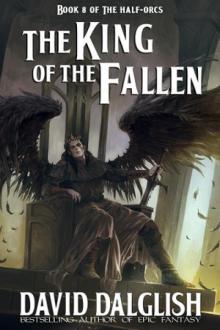 The King of the Fallen
The King of the Fallen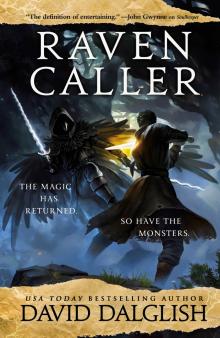 Ravencaller
Ravencaller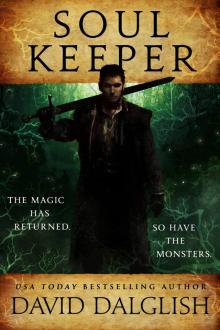 Soulkeeper
Soulkeeper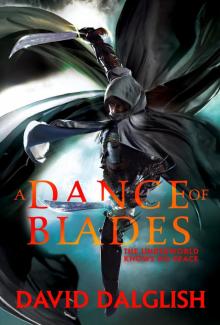 A Dance of Blades
A Dance of Blades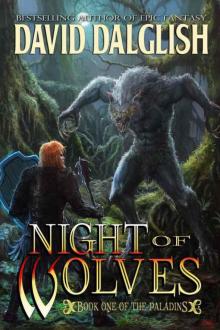 Night of Wolves p-1
Night of Wolves p-1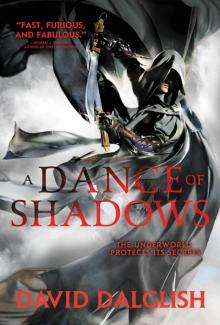 A Dance of Shadows
A Dance of Shadows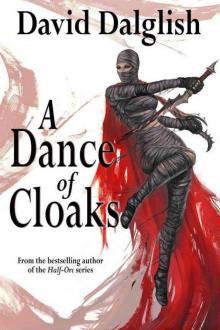 A Dance of Cloaks s-1
A Dance of Cloaks s-1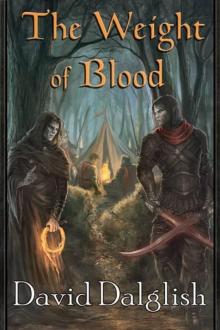 Weight of Blood
Weight of Blood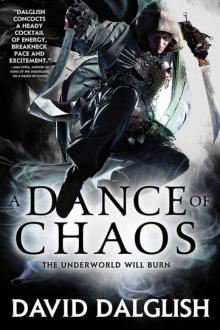 A Dance of Chaos
A Dance of Chaos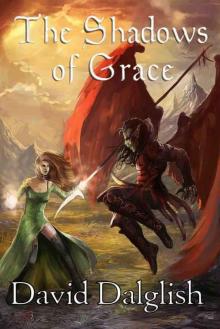 The Shadows of Grace h-4
The Shadows of Grace h-4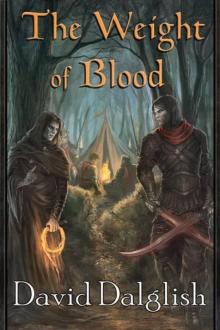 Weight of Blood h-1
Weight of Blood h-1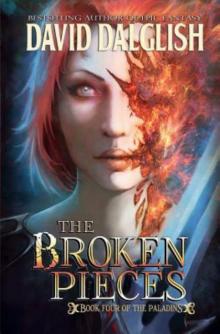 The Broken Pieces
The Broken Pieces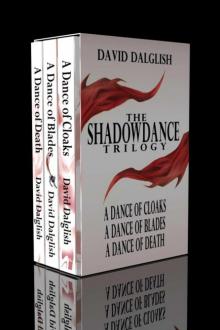 The Shadowdance Trilogy
The Shadowdance Trilogy A Dance of Death (Shadowdance Trilogy, Book 3)
A Dance of Death (Shadowdance Trilogy, Book 3)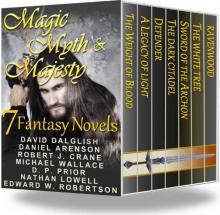 Magic, Myth & Majesty: 7 Fantasy Novels
Magic, Myth & Majesty: 7 Fantasy Novels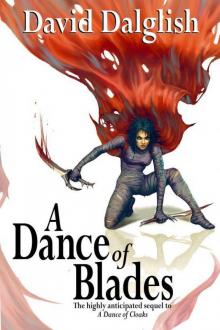 A Dance of Blades s-2
A Dance of Blades s-2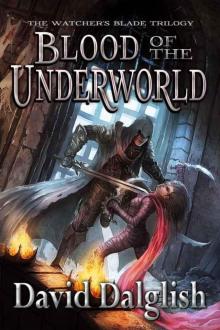 Blood of the Underworld
Blood of the Underworld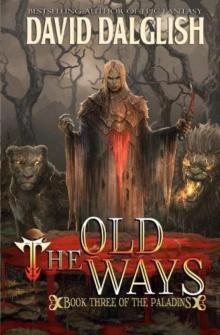 The Old Ways p-3
The Old Ways p-3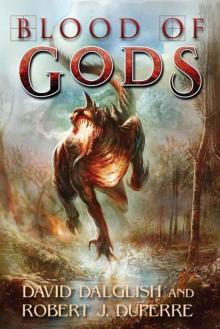 Blood Of Gods (Book 3)
Blood Of Gods (Book 3)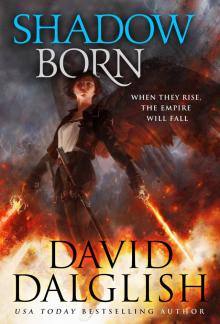 Shadowborn
Shadowborn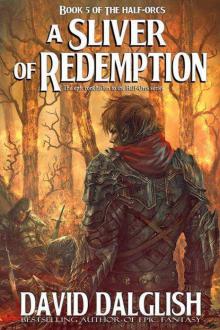 A Sliver of Redemption (Half-Orcs Book 5)
A Sliver of Redemption (Half-Orcs Book 5)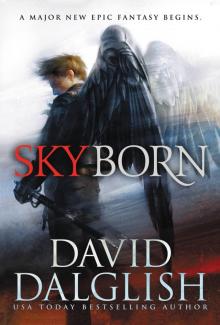 Skyborn
Skyborn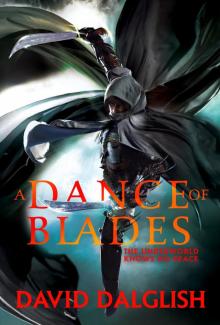 A Dance of Blades (Shadowdance 2)
A Dance of Blades (Shadowdance 2)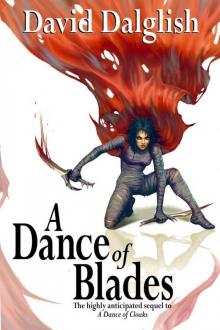 A Dance of Blades, (Shadowdance Trilogy, Book 2)
A Dance of Blades, (Shadowdance Trilogy, Book 2)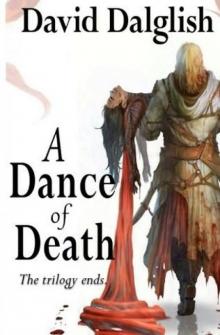 A Dance Of Death s-3
A Dance Of Death s-3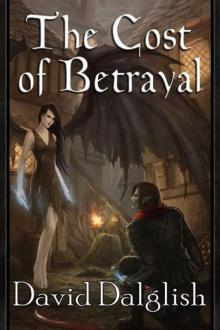 The Cost of Betrayal (Half-Orcs Book 2)
The Cost of Betrayal (Half-Orcs Book 2)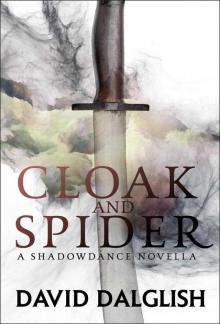 Cloak and Spider: A Shadowdance Novella
Cloak and Spider: A Shadowdance Novella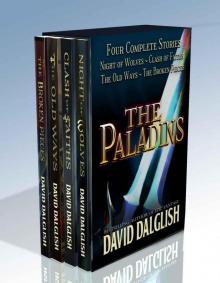 The Paladins
The Paladins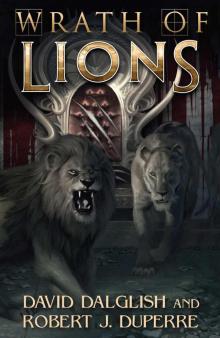 Wrath of Lions
Wrath of Lions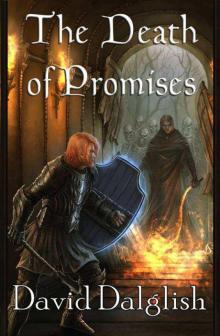 The Death of Promises (Half-Orcs Book 3)
The Death of Promises (Half-Orcs Book 3)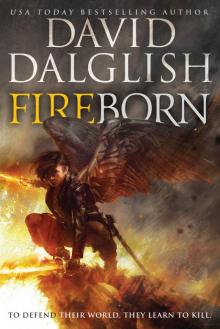 Fireborn
Fireborn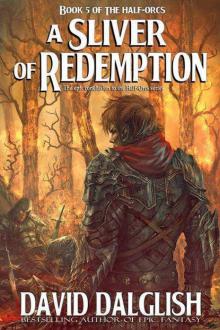 A Sliver of Redemption h-5
A Sliver of Redemption h-5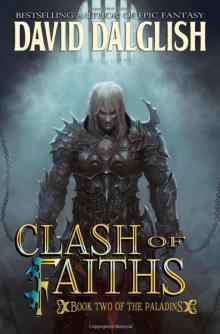 Paladins 02 - Clash of Faiths
Paladins 02 - Clash of Faiths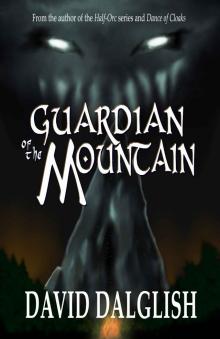 Guardian of the Mountain
Guardian of the Mountain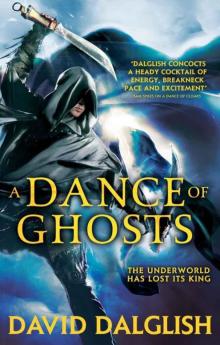 Shadowdance 05 - A Dance of Ghosts
Shadowdance 05 - A Dance of Ghosts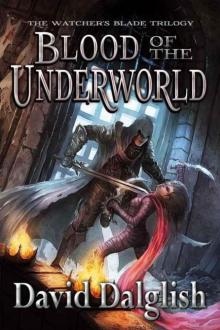 Blood of the Underworld twb-1
Blood of the Underworld twb-1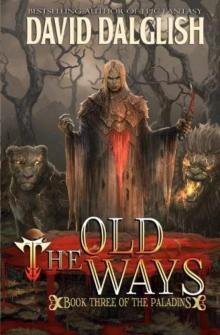 Paladins: Book 03 - The Old Ways
Paladins: Book 03 - The Old Ways Dawn of Swords
Dawn of Swords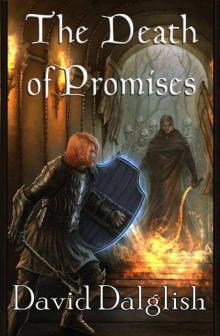 The Death of Promises h-3
The Death of Promises h-3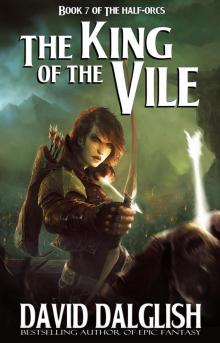 The King of the Vile
The King of the Vile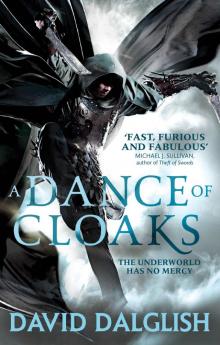 Shadowdance 01 - A Dance of Cloaks
Shadowdance 01 - A Dance of Cloaks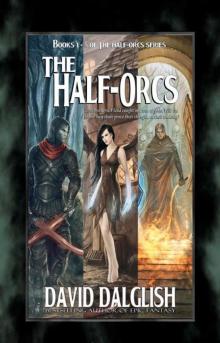 The Half-Orcs: Books 1-5
The Half-Orcs: Books 1-5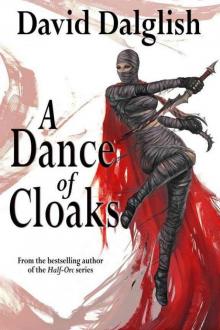 A Dance of Cloaks
A Dance of Cloaks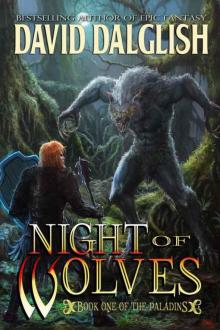 Paladins 01 - Night of Wolves
Paladins 01 - Night of Wolves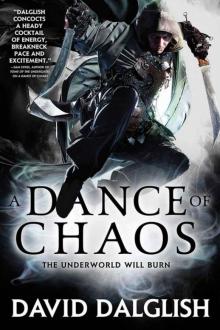 A Dance of Chaos: Book 6 of Shadowdance
A Dance of Chaos: Book 6 of Shadowdance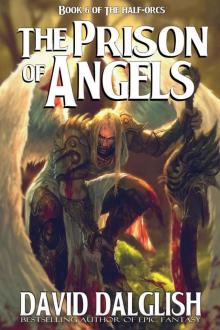 The Prison of Angels h-6
The Prison of Angels h-6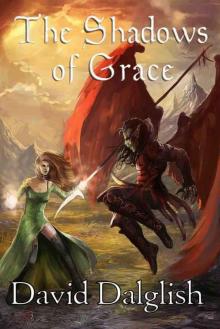 The Shadows of Grace (Half-Orcs Book 4)
The Shadows of Grace (Half-Orcs Book 4)